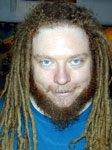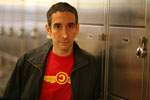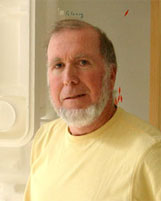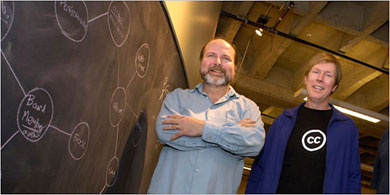And this is the other thing about the size of the cognitive surplus we're talking about. It's so large that even a small change could have huge ramifications. Let's say that everything stays 99 percent the same, that people watch 99 percent as much television as they used to, but 1 percent of that is carved out for producing and for sharing. The Internet-connected population watches roughly a trillion hours of TV a year. That's about five times the size of the annual U.S. consumption. One per cent of that is 98 Wikipedia projects per year worth of participation.
I think that's going to be a big deal. Don't you?
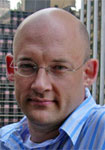
Introduction
By John Brockman
Reporting on the recent Edge Master Class 08 in Sonoma, George Dyson wrote:
Retreating to the luxury of Sonoma to discuss economic theory in mid-2008 conveys images of Fiddling while Rome Burns. Do the architects of Microsoft, Amazon, Google, PayPal, and Facebook have anything to teach the behavioral economists—and anything to learn? So what? What's new?? As it turns out, all kinds of things are new.
"All kinds of things are new", and something very big is in the air. According to Sean Parker, the cofounder of Napster, Plaxo, and Facebook (as well as Facebook's founding president) who was present in Sonoma. "If you're not on Facebook, you don't exist".
Social software has arrived, and if you don't pay attention and take onboard the developments at Google, Twitter, Facebook, Wikipedia, etc., you are opting out of being a serious player in the realm of 21st Century ideas.
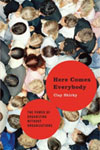 One of the more interesting contributions to the 2008 Edge World Question Center event was by Tim O'Reilly, the always-innovative guru, entrepreneur, publisher/evangelist of Web 2.0 social software revolution. In his piece (below), O'Reilly writes about his initial skepticism regarding Clay Shirky's 2002 vision of "social software". These comments are an infomative preamble to a recent talk in which Shirky coins the phrase "cognitive surplus".
One of the more interesting contributions to the 2008 Edge World Question Center event was by Tim O'Reilly, the always-innovative guru, entrepreneur, publisher/evangelist of Web 2.0 social software revolution. In his piece (below), O'Reilly writes about his initial skepticism regarding Clay Shirky's 2002 vision of "social software". These comments are an infomative preamble to a recent talk in which Shirky coins the phrase "cognitive surplus".
According to Shirky:
Starting after the second world war, a whole host of factors, like rising GDP, rising educational attainment, and rising life-span, forced the industrialized world to grapple with something new: free time. Lots and lots of free time. The amount of unstructured time among the educated population ballooned, accounting for billions of hours a year. And what did we do with that time? Mostly, we watched TV.
Society never really knows what do do with any surplus at first. (That's what makes it a surplus.) In this case, we had to find something to do with the sudden spike in surplus hours. The sitcom was our gin, a ready-made response to the crisis of free time. TV has become a half-time job for most citizens of the industrialized world, at an average of 20 hours a week, every week, for decades.
Now, though, for the first time in its history, young people are watching less TV than their elders, and the cause of the decline is competition for their free time from media that allow for active and social participation, not just passive and individual consumption.
The value in media is no longer in sources but in flows; when we pool our cognitive surplus, it creates value that doesn't exist when we operate in isolation. The displacement of TV watching is coming among people who are using more of their time to make things and do things, sometimes alone and sometimes together, and to share those things with others.
When Shirky first made this assertion at a tech conference, he was astonished to see the video of the speech rocket around the web faster and more broadly than anything else he had ever said or done.
Shirky believes that "we can take advantage of our cognitive surplus, but only if we start regarding pure consumption as an anomaly, and broad participation as the norm. This not a dispassionate argument, because the stakes are so high. We don't get to decide whether we want a new society. The changes we are under can't be rolled back, nor contained in the present institutional frameworks. What we might get to decide is how we want this change to turn out."
"To call the current opportunity 'once in a lifetime'", he continues, "understates its enormity; the change in the social landscape is altering institutions that have been stable for generations, and making possible new kinds of human engagement that have never existed before. The results could be a marvel, or a catastrophe, depending on how seriously we try to shape what's possible."
If you want new, and original thinking, look no further.
Edge is pleased to present the video and transcript of Shirky's talk below with the hope that an ensuing Reality Club discussion will further sharpen the argument.
— JB
CLAY SHIRKY is an adjunct professor in NYU's graduate Interactive Telecommunications Program (ITP), where he teaches courses on the interrelated effects of social and technological network topology—how our networks shape culture and vice-versa. He is the author of Here Comes Everybody.
Clay Shirky's Edge Bio page

[16:30 minutes]
THE REALITY CLUB: Nicholas Carr, Chris Anderson, James O'Donnell




